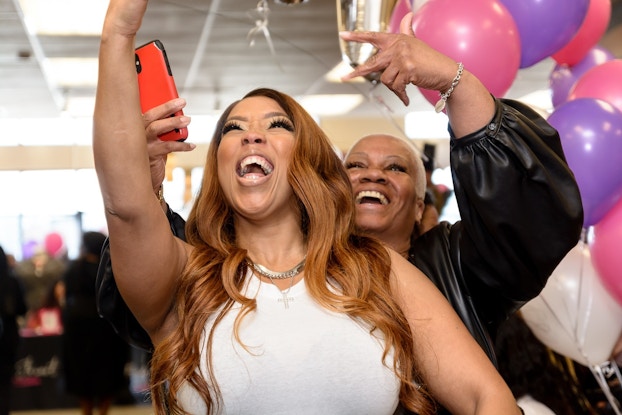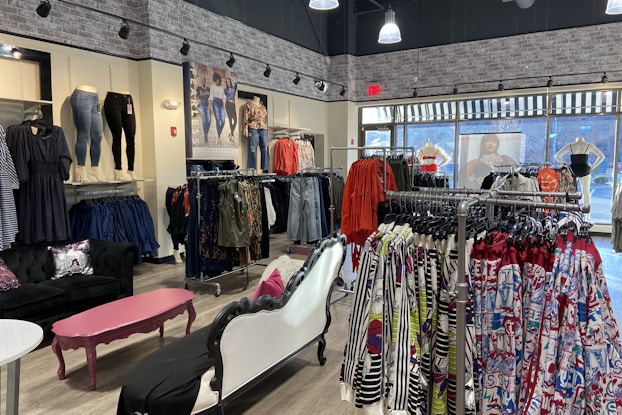
Black women matter to James Rhee, CEO of Ashley Stewart since 2013. But the venture capital investor/serial entrepreneur/lawyer, who’d never run a retail chain before then, knows talk is cheap.
It was Rhee’s, “I see you, I hear you, and I will serve you” focus on its core shopper, African American women who are woefully underserved by marketers, that turned a profit for the privately held plus-sized retailer in 2014, after two decades of losses.
Ashley Stewart was all set to tighten its embrace of that shopper this year in its 88 stores — which double as community hubs— with more fashion shows and performances, for one. The retailer was also readying the biggest Finding Ashley Stewart Tour to date, its signature national event. And it was amping up its fashion mix, media presence via AshleyTV and cultural capital with celebrity partners like comedienne Loni Love and the Jenner sisters to fuel customer engagement and drive sales.
Then the world suddenly changed.
Rhee recognized early on that the coronavirus was disproportionately hitting the African American communities where its stores are based. So, for the health and safety of his mostly Black female employees and shoppers, he shuttered all 88 locations on March 17, sooner than much of the retail industry, he told CO—.
Informed by a “people-over-profits” philosophy, Rhee has kept the vast majority of its full-time store employees on full time, redeploying them as community outreach workers. Their job now is to check in on shoppers to make sure they’re ok. In Rhee’s eyes, this is not busy work, but the “real” work that nurtures the employee-shopper relationships that have deepened for 22 years in Ashley Stewart’s stores.
He’s also made sure not to sugarcoat the crisis with employees. The pandemic has dealt a financial blow to the business, Rhee’s made clear. But he’s also told them “it was 100 times worse” when he took over as CEO seven years ago.
“We’ve been through tough times together,” Rhee said, transforming a business that was on life support into a profitable chain. And that transformation is helping to guide Ashley Stewart’s pandemic-fueled challenges today.
From day one, I have focused on staying true to the 22 years of trust that our customers and employees had with one another before [I entered] the scene.James Rhee, CEO, Ashley Stewart
Financial trouble?
Ashley Stewart pulled itself out of Chapter 11 bankruptcy and redefined its strategy to embrace its customers and turn profit. If your business is in financial trouble and needs help, read on.
‘A gigantic metaphor’
When Rhee took over Ashley Stewart in 2013, he inherited a business that struggled to raise capital and had been marginalized from the larger retail world, what he saw as a “gigantic metaphor” for how black women are invisible and “undervalued” in the consumer economy, he said.
“I got involved less as a capitalist and more as a former law person who thought I was going to be a public defender — I thought it was unjust,” said Rhee, who has a J.D. from Harvard Law School. “I use business to try to effect change.”
His simple plan: Build a business that places the Black woman at the center of the narrative.
It could be said that Rhee’s in the tradition of unorthodox servant leaders, calling to mind Jim Sinegal, the former CEO of Costco, who is known for paying store employees wages 40% higher than competitors.
For Rhee, a mutual kinship with the Ashley Stewart woman forged organically, in part, because when he looks at them, he sees his mom. “Like my mother, the Ashley Stewart customer is a woman who leads by example, cherishes her family and friends, and puts everyone else first — and yet rarely gets or asks for credit,” he said.
“From day one, I have focused on staying true to the 22 years of trust that our customers and employees had with one another before [I entered] the scene,” Rhee said.
To turn around the brand, which was in Chapter 11 bankruptcy for the second time when Rhee took the helm, he set out to build an ecosystem for Ashley Stewart’s core, fiercely loyal shopper.
Rhee applied his investment savvy to a retail model, creating a “mathematically sound set of supply/demand equations,” he said. In practical terms, that allowed the retailer to invest in more fashion than basics — think fewer black tees and more off-the-shoulder glam tops — “yielding as much gross [profit] margin dollar as possible and as often as possible.”
That inventory optimization push supported a marketing strategy that leveraged the “highly engaged relationships our customers have with Ashley Stewart,” Rhee said.
The revival plan also brought celebrities with “‘Capital I’ influence” into its fashion mix, and by extension, its community, which benefits both parties, he said. These include Love, whose clothing line hit the chain’s stores last fall. Other recent launches include the first inclusivity-sized collection from Jenner sisters Kendall+Kylie.
“When we partner with La La Anthony and Loni Love and Whoopi Goldberg, yeah, we’re selling their product, but increasingly what’s happening is … they know we have eyeballs and it’s good for them.”

‘A third place’ that boldly fetes full-figured women
Like Starbucks, which famously positioned its coffee bars as consumers’ “third place” after their homes and workplace, and Apple’s “store of the community,” “what’s so powerful about the Ashley Stewart story is the community of women that bond at these stores and can be themselves,” said Marie Driscoll, managing director of luxury and fashion at Coresight Research, a global research and advisory firm specializing in retail and technology. “Rhee sees the value of their connectedness and community and their ability at peer-to-peer selling, as they’re advocates for the brand, and can be advocates for other brands [they carry], and that becomes the power of this community — they can attract their friends to Ashley Stewart’s fashion,” she said.
And by forgoing the dowdy, utilitarian looks that have long been synonymous with plus-sized apparel, Ashley Stewart is in sync with the body positivity movement that celebrates full-figured women, who remain underserved by marketers, Driscoll said.
Indeed, Ashley Stewart’s customer reflects a doubly underserved market: African American, full-figured women.
The plus-size women’s apparel market in the U.S. is an estimated $30.7 billion business serving approximately 31 million women, according to Coresight Research.
Although brands from American Eagle to Dolce & Gabbana are catering more to the plus-size market, just as direct-to-consumer players like Adore Me lingerie and Eloquii court the business, “it remains underserved,” Driscoll said.
That’s a missed opportunity, she said, noting a “psychological mindset change” among full-figured consumers in recent years, whereby leggings and oversized sweatshirts just won’t do. The plus-sized woman is now saying, “I want to have all the fashion that comes in size 2, 4, 6 and 8,” from sexy dresses to prints, ruffles and florals — looks that embody self-expression, Driscoll said.
While fashion is a riskier inventory investment for a retailer than basic apparel as fashion goes in and out of style, “The Ashley Stewart consumer cares more about fashion than the average consumer. Rhee knows his consumer,” and balances supply and demand accordingly, she said.

The strategy has paid off. Pre-pandemic, Ashley Stewart was set to book north of $150 million in sales this year and notch yet another year of profitability, Rhee said. The e-commerce business is now nearly 50% of total sales, contributing margins north of 20%, he said.
That’s worth noting, as the plus-size retail market has been an embattled space of late, with big players like the Avenue liquidating its stores last year as Lane Bryant’s troubles deepen amid the pandemic.
Ashley Stewart’s highly penetrated and profitable online business — a relative anomaly among legacy retail chains, Rhee said, has also helped gird the brand during the current crisis as stores went dark.
Rhee doesn’t think of Ashley Stewart as a retailer, but rather a “movement” that celebrates African American women. The movement’s shining moment is the Finding Ashley Stewart Tour, a celebration of its mission to further women's empowerment, inclusivity and body positivity.
The nationwide contest, which generated over one million votes in 2019, searches for the retailer’s 2020 ambassador, an everyday woman who embodies the brand’s essence. The winner receives a $10,000 cash prize, an Ashley Stewart wardrobe and more, while a college student is awarded the $5,000 Ashley Stewart Leadership Scholarship. The Sept. 12 finale was set to move to grander digs this year at NJPAC, with Loni Love hosting. But the pandemic nixed those plans, and the contest has been moved online.

A cautious reopening strategy that starts with appointment-only stores
Rhee says his background as a distressed investor has come in handy during the crisis: Ashley Stewart has ample cash reserves as he’s managed the business conservatively. “We’ve stashed a lot of cash under the mattress,” he said.
The retailer is letting local executive orders, safety metrics and employee input guide its store reopening plan. It was store associates who came up with the appointment-only model of the six Ashley Stewart locations that reopened this month in Texas, Mississippi and South Carolina. Three women per hour shop the store “for a really tailored shopping experience,” Rhee said. “The store managers co-authored these protocols and we’re doing it at a pace we feel comfortable.”
Rhee reminds employees that back in 2013 when Ashley Stewart was bankrupt — “when there was no cash and no e-commerce business to speak of” — customers brought back clothes hangers to the store because they knew the company was in trouble. It was a potent sign of their brand loyalty then, one that’s only blossomed in recent years amid its revival.
This time around, he tells them, “now we know each other, and now we know what we’re fighting for.”
CO— aims to bring you inspiration from leading respected experts. However, before making any business decision, you should consult a professional who can advise you based on your individual situation.
Want to read more? Be sure to follow us on LinkedIn!
CO—is committed to helping you start, run and grow your small business. Learn more about the benefits of small business membership in the U.S. Chamber of Commerce, here.









